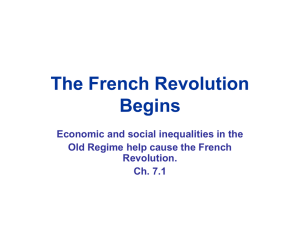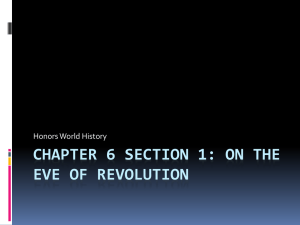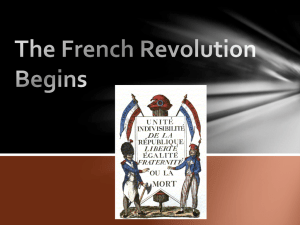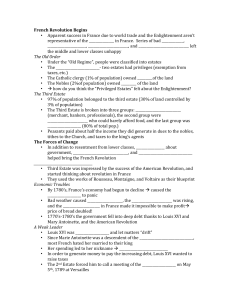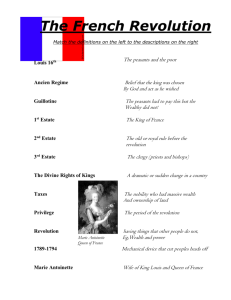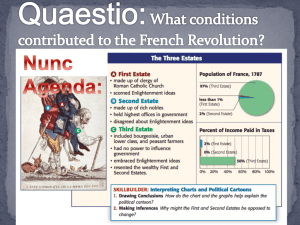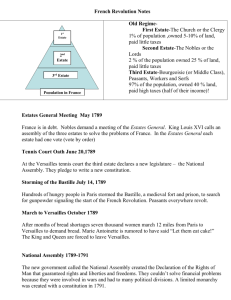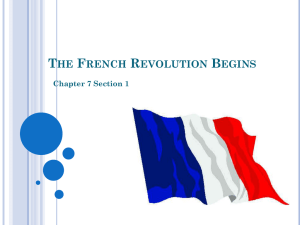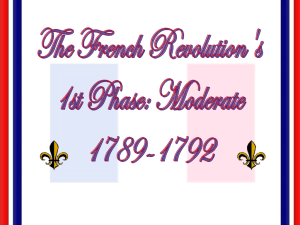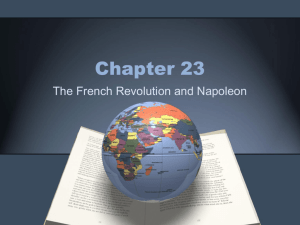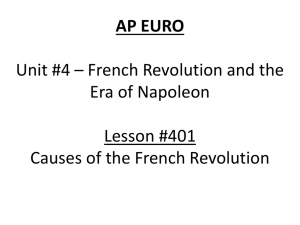First Estate Second Estate Third Estate
advertisement
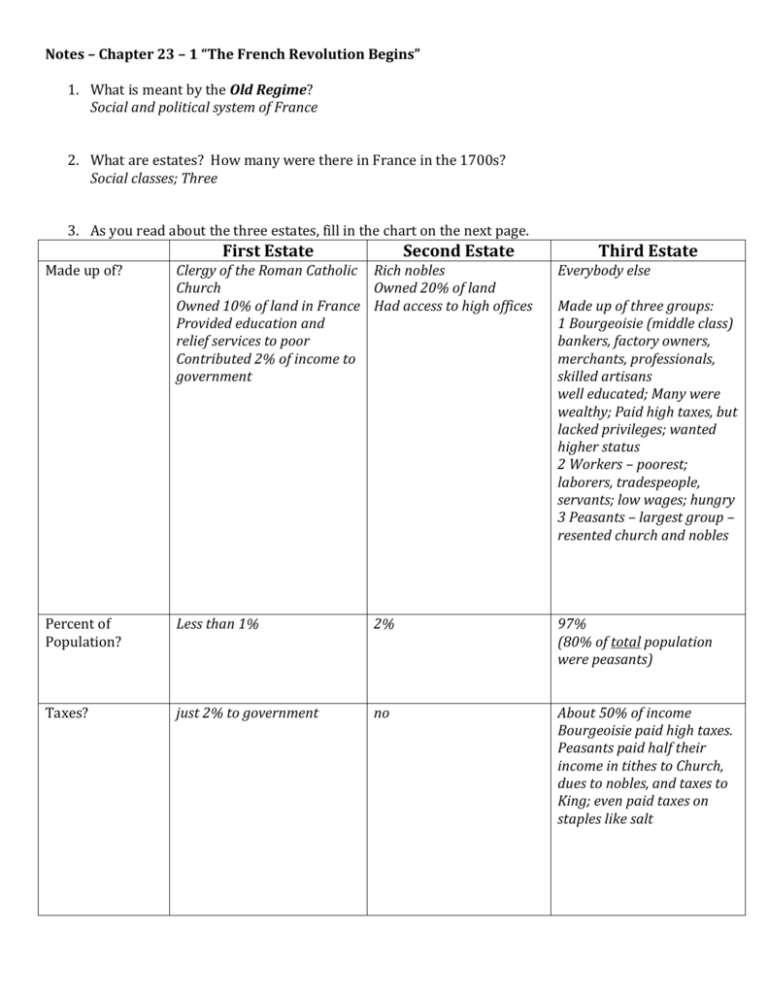
Notes – Chapter 23 – 1 “The French Revolution Begins” 1. What is meant by the Old Regime? Social and political system of France 2. What are estates? How many were there in France in the 1700s? Social classes; Three 3. As you read about the three estates, fill in the chart on the next page. First Estate Made up of? Second Estate Third Estate Clergy of the Roman Catholic Rich nobles Church Owned 20% of land Owned 10% of land in France Had access to high offices Provided education and relief services to poor Contributed 2% of income to government Everybody else Percent of Population? Less than 1% 2% 97% (80% of total population were peasants) Taxes? just 2% to government no About 50% of income Bourgeoisie paid high taxes. Peasants paid half their income in tithes to Church, dues to nobles, and taxes to King; even paid taxes on staples like salt Made up of three groups: 1 Bourgeoisie (middle class) bankers, factory owners, merchants, professionals, skilled artisans well educated; Many were wealthy; Paid high taxes, but lacked privileges; wanted higher status 2 Workers – poorest; laborers, tradespeople, servants; low wages; hungry 3 Peasants – largest group – resented church and nobles 4. The members of which estate were most likely to support Enlightenment ideas? Third 5. Besides the resentment of the lower classes, explain the three other factors that contributed to the revolution. 1. Enlightenment Ideas – spreading among third estate; third estate inspired by success of American Revolution; began questions long-standing ideas about the structure of society; began to demand equality, liberty, and democracy 2. Economic Troubles – 1780s – economy in decline – high taxes made it impossible to conduct business profitably within France; cost of living rising sharply; bad weather caused widespread crop failure resulting in grain shortage; price of bread doubled in 1789; starvation Government in debt, partly due to extravagant spending of Louix XVI and Marie Antoinette, the cost of helping American revolution against France’s enemy, Britain, and debt from previous kings 1786 – bankers refused to lend Louis more money 3. A Weak Leader – Louis XVI was indecisive, didn’t pay much attention to govt advisers, little patience for details of governing. Marie Antoinette gave poor advise and was unpopular since she was Austrian, France’s enemy; spent a lot of money (Madame Deficit) Louis didn’t cut expenses, then proposed taxing nobility. 1789 - Forced to call Estates General which hadn’t met in 175 years 6. What was the Estates-General? How did they traditionally meet? How many votes did each Estate have? An assembly of representatives from all three estates; Met in Versailles, in separate hall; each estate had one vote (so 1st and 2nd estates always outvoted 3rd) 7. How did the Third Estate want to change the Estates-General? Meet together and each delegate have on vote (so 3rd estate would have most votes) King said no and sided with nobles 8. What was the National Assembly? Who was it made up of? What did they want to accomplish? June 17th, 1789 – 3rd estate name themselves the National Assembly; pass laws and reforms in the name of the French people; essentially proclaimed the end of the absolute monarchy in France 9. What was the Tennis Court Oath? What was it response to? How did Louis react to it? Third estate delegates locked out of their meeting room, so met on a tennis court and pledged to stay until they had drawn up a new constitution. Some nobles and clergy who supported reform joined them. Louis stationed his army around Versailles. 10. Describe the storming of the Bastille. Rumors spread that Louis was using military to break up National Assembly and that foreign troops were coming to Paris to massacre French citizens. People began to gather weapons. July 14 th, 1789, a mob stormed the Bastille (prison where many political prisoners were held and where they believed weapons were stored.) Mob overwhelmed guards and seized control of building, killing the commander and several guards Symbolic act of revolution. Still celebrated in France as Bastille Day (like our 4 th of July( 11. What was the Great Fear? What set it off? As rebellion spread from Paris to countryside, rumors that nobles were hiring outlaws to terrorize peasants set off a panic known as the Great Fear. Peasant began attacking nobles and manors 12. What was the reason for the women’s riot and march on Versailles? What did they want? What was the result? October, 1789 – riots over rising price of bread (a staple). With weapons like knives and axes, they marched to Versailles to demand National Assembly do something about bread; then turned on king and queen. Demanded Louis and his family return to Paris with them. They did.
